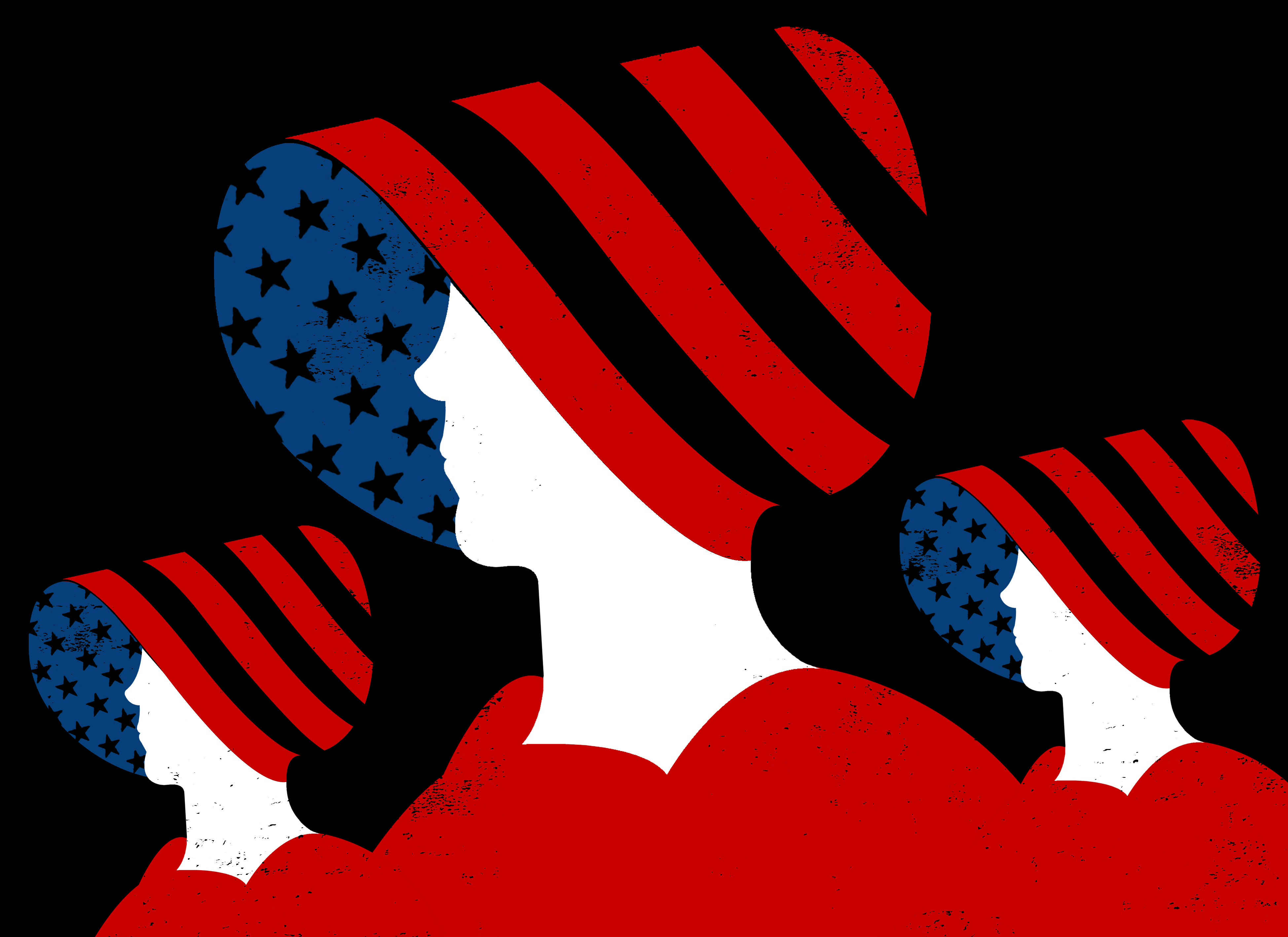I’ve finally caught up with Hulu’s spectacular The Handmaid’s Tale, just in time for its unsettling second season. What seemed far-fetched in 1985, when Margaret Atwood’s knife-keen, dystopian novel first appeared, has now become all too feasible, what with Trump’s rise and the Right’s increasingly brazen tangos with fundamentalism and white supremacy. It’s easy to imagine Atwood’s work (she took the right-wing logic of the material 1980s to endgame extremes) as a literary response to the stern prophecy of Orwell’s 1984 and to the advent of the “Reagan Revolution.”
The TV adaptation of Atwood’s classic does triple, then quadruple, duty, suggesting both a dismaying future and harsh, earlier American eras: witch-burning Puritan times; the cruel antebellum South of iron-eyed overseers and runaway slaves; the current rise of soft-pedaled fascism and fundamentalism; and a nightmarish future in which women are mostly physically barren and divided into demeaning categories—Econowives, Unwomen (transgressors who have violated the codes and dicta of Gilead, the authoritarian regime that takes over the United States), Handmaids, Marthas, and Mothers—female underlings, illiterate by law, stripped of all autonomy and voice, save for a tattoo of religious platitudes and bland homilies, such as “Under his eyes” and “Blessed be the fruit.”
The Handmaids are named after their commander-owners: Ofglen (“of Glenn”), Offred (“of Fred”), etc. At the heart of totalitarian Gilead’s fertility rites is a warped ritual inspired by the biblical tale of Hagar, so that the docile wives hold the Handmaids’ arms while the commanders attempt to impregnate them (with nary a hint of eroticism), in an act so clinical and dehumanized, it suggests 19th-century slave breeding or the Lebensborn, the Nazis’ secret breeding program for begetting Aryan children that often used women who had been kidnapped from occupied territories.
In this immensely lauded series, winner of the Best Drama Emmy and a slew of other awards, America as we know it has collapsed into out-and-out, Bible-based tyranny. We’re in a bleak Boston and Cambridge of the near future, where machine guns loom and hooded bodies are brutally strung from the wall of what was once Harvard; where citizens refer, in numb fashion, to “university purges” and the massacre of journalists, LGBT people, and prominent leaders. In the second season, Offred/June is shunted into hiding in the emptied offices of The Boston Globe, where the blood-splattered walls and abruptly abandoned personal items speak volumes.
The show has some of the best, most organically effective flashbacks in any TV series that I can remember, detailing the frayed, toppling America before the locked-in, soul-deadening Republic of Gilead. The glimpses we get of the unraveling United States are quickly, succinctly presented—to potent and chilling effect: at a store, June finds her credit card declined, as access to money is suddenly denied to women; in the midst of workday events, June and her husband learn from a TV broadcast that a terrorist attack has wiped out much of the legislature in Washington. Another benefit of the cogent flashbacks: just when we feel the need to glean more about a given character behind the savagely imposed Gilead masks, the backstory arrives, right on time.
For lovers of acting, The Handmaid’s Tale is an unfailing feast and places operatic, even acute demands on its key actresses. Elizabeth Moss, so wonderful and indelible as the female lead in Mad Men, has the role of a lifetime in Offred/June; her no-nonsense face and steely mien are perfectly suited to the Puritanical cowl of her strict white and scarlet uniform. In the show’s most riveting scenes, we often depend on Moss’s determined eyes to guide us toward the truth beneath the rampant terror, subterfuge, and roller-coaster cruelty: her laser-fine acting is superb.
June’s staunch friend Moira (Samira Wiley), an appealing, snappy lesbian in pre-takeover America, in Gilead is enslaved, first as “a gender traitor,” then as a Jezebel, a high-class prostitute in a fancy den kept by Gideon’s secretly sinning elite. Her chameleon performance is continually surprising and absorbing.
Emmy-winner Ann Dowd, as the sinister Aunt Lydia, who grooms the handmaids with a breathtaking ferocity, does so much with her blazing eyes (that intermittently show glints of empathy and compassion for her handmaids’ plight): at times Aunt Lydia is a prim, deeply offended sourpuss (like Oscar-winner Louise Fletcher’s Nurse Ratched in One Flew Over the Cuckoo’s Nest) and then, faced with insubordination, she turns back into a poster girl for Hannah Arendt’s banality of evil—a voracious monster, demanding sicko mother-love and unswerving obedience.
Nick, Offred/June’s clandestine lover, played by Max Minghella, is maybe the most furtive character of all. He’s not exactly Woody Allen’s Zelig, but as the adroit flashbacks make clear, for a long time he’s both a bystander to grim history and an unprotesting recruit. He’s enlisted into the fundamentalist rebellion as a cipher-like chauffeur by slick, silver-haired corporate types (suggestive of Rick Perry and Mike Pence), who scheme, in terms of money and values, without a modicum of concern for democracy or the bloodletting that follows, the tithe for their retrograde ideals; they imagine the poor and women are only there to be managed and won’t leave their fellow citizens alone, as if they imagined God to be a kindergarten teacher. “Thoughts and prayers” hypocrites, they hanker after heaven but inadvertently fashion hell on earth.
Season Two is even more seething, dismaying, and Goyaesque than the first one, serving up continuously harrowing tableaux as the ambitious series chronicles the poisoned zones in the hinterlands of the Bible-based republic, where renegade women labor fruitlessly unto death in foully contaminated fields. Specters of the Gulag and concentration camps come readily to mind. There’s a chilling moment when Offred/June sees TV footage of her mother, Holly, a feminist doctor, as a dronelike laborer in a camp.
By now, the key actors have fully grown into their roles, and in the second season they get a chance to deepen them. Alexis Bledel, awarded an Emmy for her guest appearance as Ofglen, soars in the new episodes; we get keen flashbacks of her life as a brilliant professor, lesbian, and mother, juxtaposed with her role as a healer (and avenging angel) in the dismal camps. As Commander Fred, Joseph Fiennes is even more wolfish, conflicted, and complex than the first time around, and Yvonne Strahovsky as Serena Joy, his alternately cruel and compassionate spouse (an outspoken female leader reduced in Gilead to the “woman behind the great man”) is truly moving and infuriating to follow.
The second, even graver season is additionally graced with impeccable guest actors: Oscar-winner Marisa Tomei as an adulterous commander’s wife consigned to the camps; Tony- and Emmy-winner Cherry Jones as June’s radical, reflexively detached mom; John Carroll Lynch as a persecuted gay professor; and Bradley Whitford as a messy, eccentric commander who refuses to color within the lines. They’re all cannily cast and deliver not flashy star cameos but trenchant characters who contribute to the whole disturbing tapestry.
Commander Fred and Serena Joy head to Canada for an ambassadorial trip, a huge plus, allowing us to monitor Moira and June’s husband, two of the lucky ones who’ve escaped Gilead, and to cheer on the liberation-resistance effort. In an emotionally charged scene, Nick meets June’s husband and delivers June’s secret stash of testimonial letters from other handmaidens that detail their degradation: the subsequent media scandal spurs the commander’s diplomatic expulsion from Canada.
The wily Nick is literally given a child bride, Eden (Sydney Sweeney), a 15-year-old who’s annoyingly pious and callow, and Nick consistently resists her puppyish attempts to be a good wife. The spectacle of the still-maturing Eden’s unlikely choices and her surprising convictions form one of the riveting threads in the new season: heartbreaking and visually spectacular, Eden’s show-stopping fate serves to bring us closer to an aggrieved Nick and Serena and June, who are emotionally shattered by it.
In these Orwellian days of family separation and child detention, of toddlers put on trial, The Handmaid’s Tale serves as a tonic—a gasp-inducing reminder of how swiftly governments can descend, under the banner of God and obedience, into abject indifference and savagery. In an emblematic moment, Aunt Lydia reminds Offred/June: “Gilead is inside you,” and “Gilead never ends.” Yes, Gilead is the snare and labyrinth in which the subjugated but intrepid June is lost.
Cyrus Cassells, a poet and professor of English at Texas State University, lives in Austin.







Keep tuned to look at latest Pinoy Television Shows on-line.